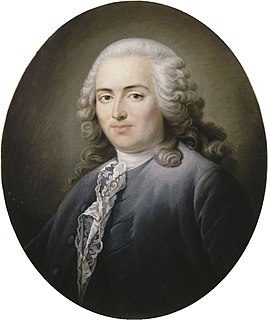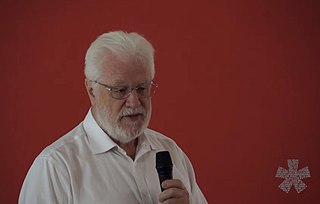A Quote by Anne-Robert-Jacques Turgot, Baron de Laune
It is not error which opposes the progress of truth; it is indolence, obstinacy, the spirit of routine, every thing which favors inaction.
Related Quotes
When we do not know the truth of a thing, it is good that there should exist a common error which determines the mind of man, as, for example, the moon, to which is attributed the change of seasons, the progress of diseases, etc. For the chief malady of man is a restless curiosity about things which he cannot understand; and it is not so bad for him to be in error as to be curious to no purpose.
Error is a supposition that pleasure and pain, that intelligence, substance, life, are existent in matter. Error is neither Mind nor one of Mind's faculties. Error is the contradiction of Truth. Error is a belief without understanding. Error is unreal because untrue. It is that which stemma to be and is not. If error were true, its truth would be error, and we should have a self-evident absurdity -namely, erroneous truth. Thus we should continue to lose the standard of Truth.
Remember that [scientific thought] is the guide of action; that the truth which it arrives at is not that which we can ideally contemplate without error, but that which we may act upon without fear; and you cannot fail to see that scientific thought is not an accompaniment or condition of human progress, but human progress itself.
Fundamentalism has stood aloof from the liberal in self-conscious superiority and has on its own part fallen into error, the error of textualism, which is simply orthodoxy without the Holy Ghost. Everywhere among conservatives we find persons who are Bible-taught but not Spirit-taught. They conceive truth to be something which they can grasp with the mind.
It is they [men of science] who hold the secret of the mysterious property of the mind by which error ministers to truth, and truth slowly but irrevocably prevails. Theirs is the logic of discovery, the demonstration of the advance of knowledge and the development of ideas, which as the earthly wants and passions of men remain almost unchanged, are the charter of progress, and the vital spark in history.
There exists a black kingdom which the eyes of man avoid because its landscape fails signally to flatter them. This darkness, which he imagines he can dispense with in describing the light, is error with its unknown characteristics. Error is certainty's constant companion. Error is the corollary of evidence. And anything said about truth may equally well be said about error: the delusion will be no greater.
It is too often believed that a person in his progress towards perfection passes from error to truth; that when he passes on from one thought to another, he must necessarily reject the first. But no error can lead to truth. The soul passing through its different stages goes from truth to truth, and each stage is true; it goes from lower truth to higher truth.
The history of science, like the history of all human ideas, is a history of irresponsible dreams, of obstinacy, and of error. But science is one of the very few human activities-perhaps the only one-in which errors are systematically criticized and fairly often, in time, corrected. This is why we can say that, in science, we often learn from our mistakes, and why we can speak clearly and sensibly about making progress there. In most other fields of human endeavour there is change, but rarely progress ... And in most fields we do not even know how to evaluate change.
The realm of the real is Spirit. The unlikeness of Spirit is matter, and the opposite of the real is not divine, it is a human concept. Matter is an error of statement. This error in the premise leads to errors in the conclusion in every statement into which it enters. Nothing we can say or believe regarding matter is immortal, for matter is temporal and is therefore a mortal phenomenon, a human concept, sometimes beautiful, always erroneous.










































